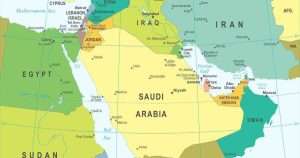Nidal Shoukeir, Professor of Strategic Communications and Government Relations in Paris, writes about the profound change taking place in the relations between Washington and its ancient allies in the Gulf after the start of the war between Israel and Gaza
By Dr. Nidal Shoukeir
 Recent clashes in the Red Sea between Houthi rebels, backed by Iran, and the United States have legitimately raised concerns about Washington’s policies in the region. These events prompt numerous questions about America’s influence, particularly as some argue that the maneuvers of the ‘Houthi militias’ have thrown the United States, a significant player, off balance in this strategically vital and globally sensitive area.
Recent clashes in the Red Sea between Houthi rebels, backed by Iran, and the United States have legitimately raised concerns about Washington’s policies in the region. These events prompt numerous questions about America’s influence, particularly as some argue that the maneuvers of the ‘Houthi militias’ have thrown the United States, a significant player, off balance in this strategically vital and globally sensitive area.
Before these events, quiet discussions abounded concerning U.S. policies in the region. Especially noteworthy was President Joe Biden’s administration’s clear orientation toward the Islamic Republic of Iran and its affiliated Houthi group, at the expense of Gulf partners, particularly the Kingdom of Saudi Arabia and the United Arab Emirates.
No one in the Gulf states forgets that one of the first decisions of the Biden administration was to remove the “Houthi militias” from the American terrorist list, at a time when their drones and ballistic missiles were targeting Saudi and Emirati cities. Riyadh and Abu Dhabi also recall how President Biden canceled and postponed arms deals that had been signed with them months earlier by the Republican administration of President Donald Trump, and how the Democratic administration refused to support them in the Yemen war. Most importantly, the Gulf’s memory is still fresh with Biden’s administration’s rush towards Tehran and its attempts to revive the nuclear file at any cost, without consulting them or even considering their security concerns, which Washington was supposed to safeguard.
The ongoing skirmishes in the Red Sea, direct U.S. involvement, and the necessity to target the Houthis have undoubtedly brought this issue to the forefront, shattering the longstanding silence surrounding it.
The American confusion in handling the maritime navigation file in the Red Sea was evident in recent days. The context of the recent events showed that Washington, “the superpower,” is unable to influence Tehran or the “Houthi militias” affiliated with it, which some accuse the Biden administration of giving “legitimacy” they desperately needed. Moreover, the current Democratic administration seems incapable of securing political and military support for the international coalition it leads under the name “Prosperity Guardian,” amid international and regional hesitation and the refusal of any significant Gulf state to join it.
Clearly, the scene in the region today is very different from what it was in the fall of 2020 when Joe Biden was elected President of the United States. The policies of the Democratic president, especially the strategy of security withdrawal from the region, have pushed the Gulf states towards new arrangements somewhat distant from Washington.
The main problem today is that this Democratic administration, which has lost much of its credibility in the Gulf, appears contradictory and disconnected from the new reality. In a dramatic scene, it tries today to convince the Gulf states of steps that were urgent demands of theirs yesterday. Ironically, these are the same steps that not only were previously rejected by the Biden administration but also chosen to move far in the opposite direction, whether in terms of confronting the Houthis or the Iranian threat in the region.
Those who look closely today clearly see that the region is living a new and different reality, full of rapid changes and transformations. This new reality is filled with realism and change, characterized by independence, self-reliance, and moving away from absolute dependency on Washington and its regional and international alignments. The current scene is primarily based on zeroing out problems, building bridges, and diversifying partnerships with many countries, including those competing with Washington like Russia and China, especially the latter, which has noticeably and strategically penetrated the region in recent years.
But most importantly, in this new reality, the American presence in the Gulf region does not appear to be at its best. The divergence in positions between the Biden administration and the Gulf states, especially Saudi Arabia and the United Arab Emirates, has reached a complex stage that can no longer be concealed. It can be said that the Red Sea navigation file is just a small point in the mountain of disputes between the two parties, the peak of which is beginning to surface.
The disparity between the Gulf capitals and Washington is large and wide, reaching a stage of conflicting interests. This was evident through contradictory positions on several fundamental regional and international issues such as the war in Gaza, the war in Ukraine, partnerships with China, orientation towards the “Shanghai Organisation” and the “BRICS alliance”, oil policies, and even the relationship with Teheran.
Therefore, the question that arises today is where are the Gulf-American relations heading? And in what context can this contradiction in positions be placed? Is it just a natural change linked to the current variables in the region, or does it come in the context of the Gulf’s “settling of accounts” with President Biden’s administration, or is it indeed, as some say, a “Gulf revolution” against the American legacy and influence in the region?
* Quoted from the French “L’Opinion”
